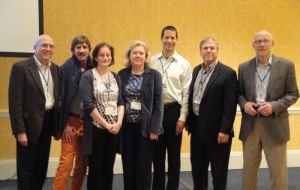MercoPress. South Atlantic News Agency
Antarctica tourism rapidly adapting to new environment-friendly rules
 IAATO Administrative Director Steve Wellmeier: the cruise-only category of visitors suffered a significant decline
IAATO Administrative Director Steve Wellmeier: the cruise-only category of visitors suffered a significant decline  IAATO Members approved two new members, Rhode Island, USA. Skip Novak (second from left) of Pelagic Expeditions and Marlynda Elstgeest (not pictured) of Waterproof Expeditions
IAATO Members approved two new members, Rhode Island, USA. Skip Novak (second from left) of Pelagic Expeditions and Marlynda Elstgeest (not pictured) of Waterproof Expeditions An expanded Executive Committee and reorganized Secretariat, new rules of procedure for compliance and dispute resolution issues, and a Marine Committee Safety Advisory were just some of the actions and decisions adopted by Members at the 23rd Annual Meeting of the International Association of Antarctica Tour Operators (IAATO), held in Providence, Rhode Island earlier this month.
IAATO also released its final tourism statistics for the 2011-12 season which concluded in early April. The total number of tourists to the region traveling with IAATO operators was 26,519, a decrease of 22% from last year’s total of 33,824.
More than 100 members, invited guests and IAATO staff from 15 different countries participated in this year’s meeting. The busy three-day agenda included approval by Members of many measures relevant to IAATO’s mission to advocate and practice safe and environmentally responsible private-sector travel to the Antarctic.
Members voted to approve Ted Cheeseman of Cheesemans’ Ecology Safaris as the new Chair of the Executive Committee, and reappointed Ute Hohn-Bowen of Antarpply Expeditions; Rich Pruitt of Royal Caribbean Cruises Ltd.; and Capt. Leif Skog of Lindblad Expeditions. New additions voted onto the Executive Committee included Skip Novak of Pelagic Expeditions and Marlynda Elstgeest of Waterproof Expeditions. The meeting also thanked Ute Hohn-Bowen for two years of service as Chair of the Executive Committee.
Adopted by Members was a reorganization of the IAATO Secretariat, resulting in the newly created positions of Administrative Director for Steve Wellmeier, previously Executive Director, and Operations Director for Dr. Kim Crosbie, previously Environmental Operations Director. The new structure will allow the Secretariat to more effectively focus on the increased workload, and to assist its members to conduct sustainable tourism activities in Antarctica in the years ahead.
Following several years of drafting and review by the compliance working group, the new rules of procedure establish an impartial and timely process for determining whether a member has violated IAATO Bylaws, directives or standard operating procedures. A new Compliance and Dispute Resolution Committee was also established, with eight Members approved to initially serve in this capacity if needed.
As part of a new Safety Advisory concept, the Marine Committee issued an advisory focused on navigation and anchoring at Whalers Bay in Deception Island, South Shetlands. The committee also reported on current discussions at the International Maritime Organization (IMO) regarding the development of a new Polar Code that could eventually regulate the types of vessels operating in Antarctic waters.
Initial trials of the three phases of the IAATO Enhanced Observer Scheme were reported to Members. The pilot phase provided useful feedback as well as insight into the various competent authority permitting processes that Members undergo each season. The scheme will continue to be trialled, on a voluntary basis, for the next three seasons.
Educating members, their field staff and passengers about the effects of climate change on the Antarctic environment continues to be a focus of IAATO’s outreach efforts. This includes the development of a new PowerPoint presentation that can be used during Antarctic voyages and other venues to disseminate the findings of recent scientific studies on the issue; analysis of an IAATO operator survey for measures to potentially reduce a passenger vessel’s carbon footprint; and ongoing use of a multilingual pamphlet, Climate Change in Antarctica – Understanding the Facts, based on the report “Antarctic Climate Change and the Environment” by the Scientific Community on Antarctic Research (SCAR).
In releasing the IAATO Antarctic tourism statistics, Administrative Director Steve Wellmeier noted that tourists from more than 100 different nations traveled with IAATO operators during the most recent Austral summer season, which ran from late October 2011 through early April 2012.
The overall season tally of 26.519 tourists represents the fourth consecutive year in which Antarctic tourism has declined. In a review of the tourist numbers by travel category, the decline was primarily seen in the cruise-only category; i.e. larger vessels carrying more than 500 passengers that do not disembark their guests ashore while in Antarctic waters. The 4.872 passengers in this category represented about one-third of the 14.373 carried during the previous season, and demonstrated the impact of the International Maritime Organization (IMO) ban on the use and carriage of heavy fuel oil in Antarctic waters, which went into effect August 1, 2011, prior to the season.
Traditional small and medium-size expedition ships and yachts – all carrying 500 or fewer passengers and conducting landings – accounted for 20.271, an increase of 9.4% over the previous season. Two other categories of Antarctic travel – air/cruise combinations and land tourism – accounted for 860 and 516 passengers respectively and together about two percent of the overall total carried by IAATO operators.
Wellmeier said that the increases during the 2011-12 season in passengers aboard expedition ships and yachts, along with those combining air travel to Antarctica and small-ship cruising, are expected to continue into the next season. The cruise-only category should also see a rebound with several more voyages than the five operated this past season. While estimates for 2012-13 season are still being finalized and will be reported soon, overall tourism numbers are projected to be in the range of 35,000, similar to the numbers of two to three seasons ago, but still below the peak of the 2007-08 season.
Members also learned at the meeting that they and their passengers together contributed approximately US$470,000 during the 2011-12 season in cash donations to Antarctic-related charitable causes, conservation and preservation organizations, adding to the total of more than US$2.5 million over the past eight years. These organizations include Save the Albatross, World Wildlife Fund, Oceanites, Antarctic Heritage Trust and others. In addition, IAATO operators transported more than 150 scientists, station and national program personnel gratis or at minimal expense to/from Antarctica during the season.




Top Comments
Disclaimer & comment rules-

-

-

Read all commentsGood to think of Antarctic tourism being accessible to middle-class income earners who can purchase cruise ship trips at reasonably affordable prices. Of course, environmental impact is an important factor to be considered, but compared to any other forms of exploitation, surely tourism ranks amongst those having the least impact.
May 22nd, 2012 - 03:16 pm 0However, one of the biggest beneficial impacts of building Antarctic tourism isn't about the Antarctic, but about the Falkland Islands, because with so many cruise ships going to Antarctica, the Falkland Islands and South Georgia become a part of the regional tourism “circuit” and gain additional tourist arrivals from some of those Antarctic-bound ships.
References:
Falkland Islands Tourism: http://www.falklandislands.com/
”These cruises often include visits to the nearby Falkland Islands (Islas Malvinas) and South Georgia.”, in Where do Cruises Depart From?
http://www.falklandislands.com/
why would people choose to go to a deslote, freezeen, all ice desert place on vacations??? for doing what??? to see what????
May 23rd, 2012 - 11:39 pm 0If you want to enjoy a little of tourism in the south end of the earth, go to Tierra del Fuego, plenty of things to do and places to enjoy. Also enjoy glaciers, national parks, mountains, etc etc. Visit Patagonia, you would like it.
“Visit Patagonia, you would like it.”
May 30th, 2012 - 12:27 pm 0No thanks, too many Argetards, think I'd prefer British Falklands and South Georgia.
Commenting for this story is now closed.
If you have a Facebook account, become a fan and comment on our Facebook Page!